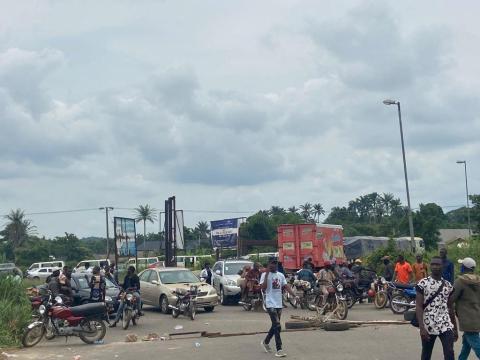
On March 14, the association extended the strike action by another two months to afford the government more time to address all of its demands.
Students of tertiary institutions across the country have taken to the streets to protest the ongoing strike action by the Academic Staff Union of Universities (ASUU).
SaharaReporters gathered that the students, in their resolve to make the Nigerian Government and academia come to a reasonable conclusion have embarked on protests in some states to register their displeasure with the lingering strike.

ASUU had embarked on a four-week warning strike on February 14 to press home its demands, with the prominent ones being the renegotiation of the ASUU/FG 2009 agreement and the sustainability of the university autonomy by deploying UTAS to replace the government-imposed IPPIS.
Other demands include the release of the reports of visitation panels to federal universities, distortions in salary payment challenges, funding for revitalisation of public universities, earned academic allowance, poor funding of state universities and promotion arrears.
On March 14, the association extended the strike action by another two months to afford the government more time to address all of its demands.
The union in a statement by its President, Prof. Emmanuel Osodeke last Monday said it would be extending the ongoing strike by another 12 weeks.

One bone of contention for the striking lecturers is the non-payment of university revitalisation funds, which amounts to about N1.1 trillion.
But the Nigerian Government has said it doesn’t have the money to pay such an amount, citing low oil prices during the Muhammadu Buhari administration.
With students bearing the brunt of the disagreement, students of the University of Ibadan, Federal University of Technology, Akure and their counterparts from the Olabisi Onabanjo University in Ago Iwoye, Tai Solarin University of Education in Abeokuta, and the Federal University of Agriculture in Abeokuta embarked on protests on Monday, demanding an end to the strike.
Many commuters travelling along Ife/Ibadan expressway are currently stranded in Ile-Ife as varsity students protesting against the current industrial action on Monday blocked the road.
The students also blocked some of the adjoining routes such as the one linking Ipetomodu.
Speaking to SaharaReporters, Chairman, Nigeria Association of University Students (NAUS), Eruobami Ayobami said that the protest became necessary because they were tired of staying at home.
Ayobami said their rights as students are being trampled upon by the government.
“We have again taken over the Ile-Ife/Ibadan expressway. No movement at all, we have blocked the highway around Oduduwa University,” he told SaharaReporters.
Some of the students in Oyo caused a roadblock at the University of Ibadan-Sango Road, on Monday. According to them, the roadblock will make others feel the brunt of their sufferings.
They called the government and the union to resolve their differences.
The students, who described the strike as needless, said that they would continue to occupy the roads if the campuses remained shut.
One of the students, Damilola Olubunmi told Daily Post that the ongoing industrial action is affecting not only the students but their parents.
“I am here because we need to tell the Federal Government that students must resume. The strike is not affecting the students alone.
“The essence of this is that when the road is blocked, people cannot move and they will trend it for us. Then the government will know that we protesting.”
Their counterpart in Ondo State carried out a similar action, barricading the Akure-Ilesa highway, protesting against the ASUU strike.
Several motorists and other road users were also left stranded as the students chanted solidarity songs.
They displayed placards with inscriptions including ‘End ASUU Strike’, ‘Save our future’, and ‘Stop Toying with our Future’.
Last week, students of Obafemi Awolowo University, Ile-Ife, Osun State, had also taken to the Ife-Ibadan Expressway to protest against the strike.
This development followed similar actions taken by students of the University of Ilorin and the University of Lagos.